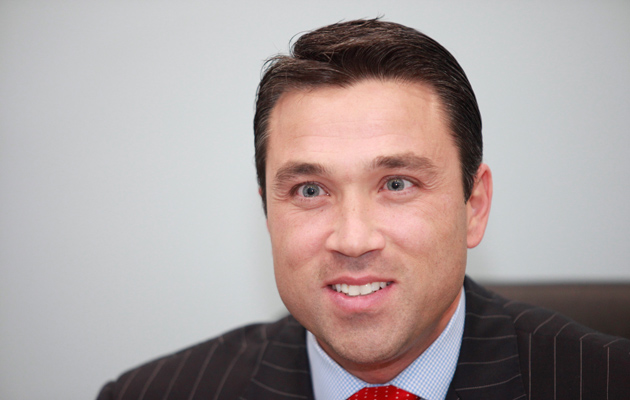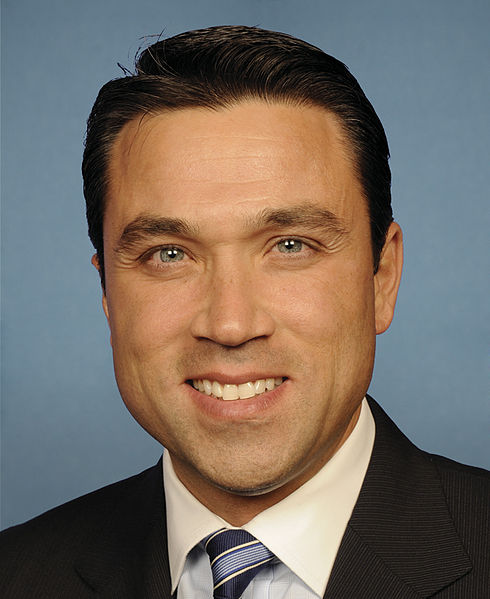As the new Congress is sworn in today, New York’s 11th district, comprising Staten Island and parts of Brooklyn, has been left without a lawmaker in the House of Representatives. The missing member: Republican Michael Grimm. The disgraced politician announced his resignation last month after pleading guilty to tax evasion—a federal felony. He officially left Congress yesterday and will be sentenced in June.
If New York’s tabloid headline writers are anything to go by (“Good Riddance!” said the Daily News), the city won’t muster much sympathy for a man who cheated on his taxes when he ran a restaurant (before running for Congress). Nor will it miss his aggressive style: “I’ll break you in half. Like a boy,” he once told a television reporter.
Oh yeah, and there was that time he allegedly waved a gun around at a nightclub in Queens when he was an F.B.I. agent. (Grimm has denied doing this.)
But there is one lesser known fact about Michael Grimm worth taking a moment to mourn as he leaves office: He was one of a precious few Republican politicians who actually accepted the science of climate change.
That wasn’t always the case. During a campaign debate in 2010, Grimm told the audience that “the jury is obviously still out on it. We see nothing but conflicting reports from across the globe.” He added, “I’m not sure, I’m not a scientist”—that now-familiar line deployed by a number of Republican politicians.
But then Grimm had his come-to-science moment, which was documented in last year’s award-winning Showtime docu-series, Years of Living Dangerously. In a segment exploring the impacts of Superstorm Sandy on Grimm’s New York district (you can watch part of it above), the congressman recounted how his thinking had changed. Here’s a transcript (via The Huffington Post), featuring interviewer Chris Hayes, from MSNBC:
HAYES: Last time you and I spoke, you said the jury was still out on climate science. Do you still feel that way?
GRIMM: After speaking with Bob Inglis, it made me do some of my own research, you know, I looked at some of the stuff that he sent over, my staff looked at it. But the vast majority of respected scientists say that it’s conclusive, the evidence is clear. So I don’t think the jury is out.
HAYES: The basic story of—we’re putting carbon in the atmosphere, the planet’s getting warmer, that’s gonna make the sea levels rise—like, the basic story of that, you pretty much agree with, right?
GRIMM: Sure, I mean there’s no question that, um, you know, the oceans have risen, right? And the climate change part is, is a real part of it. The problem that we’re gonna have right now—there’s no oxygen left in the room in Washington for another big debate, that’s the reality.
It’s an otherwise pretty depressing interview, in which Grimm says that science is “irrelevant” when it comes to politics on the Hill.
In a separate segment below, Grimm elaborated on the intractable political divides that prevent lawmakers from discussing climate change. He’s speaking here to former GOP Rep. Bob Inglis, who experienced first-hand the negative impact that believing in science can have on a Republican’s career: Inglis lost his seat in South Carolina after a tea party revolt in 2010, in part because he wouldn’t publicly deny that humans were causing the globe to warm. This exchange is representative of what Years of Living Dangerously did so well in this episode. It revealed something that you or I rarely see: a frank discussion between politicians about the risk on taking on the establishment:
Republicans now control both houses of Congress for the first time since 2007, and incoming GOP lawmakers largely fall into the climate skeptic camp, as my Climate Desk colleague Tim McDonnell recently illustrated. James Inhofe, the party’s climate denial standard barer from Oklahoma, will likely be the chair of the Senate’s Environment and Public Works committee, for example.
In the House, there are a few Republicans who provide a modicum of hope, including Chris Gibson (R-NY), who assumed office in 2013, and who said last month that he plans to introduce a resolution to rally Congress to “recognize the reality” of climate change.
But for the moment, what Grimm tells Inglis in the clip above seems to be the rule among Republicans on Capitol Hill: “Let’s say that they did agree with the science, and they were bold enough, and had the political courage…and then they lose?” he said. “They’re not all lemmings. Okay? They’re not just going to go right off that cliff. So the political constraints I think are a lot bigger than most people would understand, and they’re very real.”













